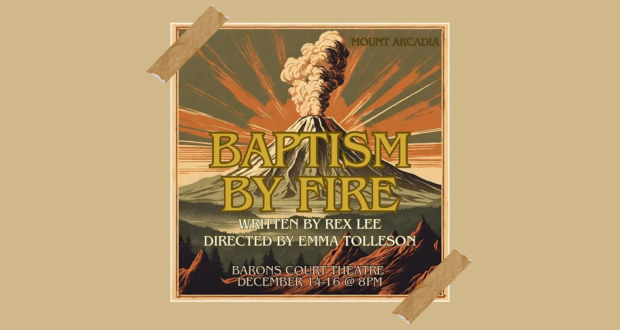What happens to characters once their story ends? Characters in a fictitious playwright’s unfinished play grapple with their fragile existence.Summary
Rating
Good
The programme, and a short introduction from the producer, explain that Baptism by Fire is “the final work by Stanislav Hristov”, a remarkable yet little-known Bulgarian playwright. Only the first scene was completed before his mysterious disappearance, and that’s what will be performed on stage.
This framing device is unusual and captures attention—a fiction within a fiction. However, its potential is dropped as soon as the play begins. Within the story itself, the identity of the playwright is irrelevant, which is something of a let-down after the intrigue of the introduction. It’s an interesting idea, but it doesn’t quite live up to its potential.
As the audience enters the space, two men stand on stage with their backs to the wall and their eyes closed. Props such as cans of soup, a backpack and various hiking equipment are scattered across the room. And then, as the lights come up, they burst into life.
The exposition is somewhat hurried in order to get into the bulk of the piece. Questioning their own actions and choices of words (“why am I always kneeling?” “why are you my captain?”), the two find an unfinished script tucked behind some shelves and realise that they are not, in the traditional sense, real people. They also find a gun.
The play works well in a small space– a pub basement with a low ceiling, black painted walls and seats on all but one side of the stage. This helps to create the feeling of entrapment that the characters are so horrified by, and it allows a layer of added intimacy when the fourth wall is broken—as it is very early on.
Connor Rowlett and Rex Lee are compelling in their roles, hitting each comic beat and maintaining a strong connection with the audience throughout. Switching between the almost stilted, heightened tone of their scripted lines to the hesitancy and uncertainty of their words and movements in the more ‘organic’ moments as they try to figure out who they actually are is particularly effective.
While the beginning of the play is intriguing, and the comic elements, which ramp up over the first half, are engaging, the script loses itself a little in the middle. Ideas are repeated but don’t really go anywhere, and the characters begin to talk in circles. It could be Beckettian but just misses the mark.
There’s a strong existentialist theme throughout, as the characters gradually realise that their god—the playwright—has probably and irreparably given up on them. This is a concept with a lot of potential, but it feels as though the play can’t quite break free of its restraints to develop this point beyond its immediate context.
A few brief comments are made to the complicity of the audience in the characters’ suffering. After all, they’ve all come here to watch the scene play out, to see some act of violence. The audience’s interest sustains them, they learn. It keeps them ‘alive’ and safe from some painful, unknown state of not being.
What happens once you’ve served your purpose? We never find out. As the characters complete the lines they’ve been made to say, the actions they’ve been designed to do, they return to their starting positions, backs against the wall, eyes closed. They take no curtain calls. The spotlights dim, the house lights come up, and they head off into that unknown ‘other’ without us. What else can they do? The alternative is remaining in purgatory, begging for their lives on a stage they cannot escape from.
A Baptism by Fire is an ambitious production with a lot of ideas. Though it doesn’t succeed in everything it tries to do, it’s an entertaining performance from a cast and crew who are certainly worth keeping an eye on.
Written by: Rex Lee
Directed by: Emma Tolleson
Produced by: Hannah Limbrick, Valeria Suaste
Original music by: Hannah Limbrick
A Baptism by Fire has completed its current run at Barons Court Theatre.
 Everything Theatre Reviews, interviews and news for theatre lovers, London and beyond
Everything Theatre Reviews, interviews and news for theatre lovers, London and beyond



